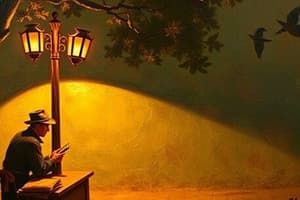Podcast
Questions and Answers
What does 'hablé' mean?
What does 'hablé' mean?
- I spoke (correct)
- I lived
- I ate
- I danced
What does 'hablaste' mean?
What does 'hablaste' mean?
- I spoke
- They spoke
- You spoke (correct)
- We spoke
What does 'habló' mean?
What does 'habló' mean?
- You spoke
- They spoke
- I spoke
- He/she spoke (correct)
What does 'hablamos' mean?
What does 'hablamos' mean?
What does 'hablasteis' mean?
What does 'hablasteis' mean?
What does 'hablaron' mean?
What does 'hablaron' mean?
What does 'comí' mean?
What does 'comí' mean?
What does 'comiste' mean?
What does 'comiste' mean?
What does 'comió' mean?
What does 'comió' mean?
What does 'comimos' mean?
What does 'comimos' mean?
What does 'comisteis' mean?
What does 'comisteis' mean?
What does 'comieron' mean?
What does 'comieron' mean?
What does 'viví' mean?
What does 'viví' mean?
What does 'viviste' mean?
What does 'viviste' mean?
What does 'vivió' mean?
What does 'vivió' mean?
What does 'vivimos' mean?
What does 'vivimos' mean?
What does 'vivisteis' mean?
What does 'vivisteis' mean?
What does 'vivieron' mean?
What does 'vivieron' mean?
Flashcards
Hablé
Hablé
I spoke (in Spanish)
Hablaste
Hablaste
You spoke (in Spanish)
Habló
Habló
He/She spoke (in Spanish)
Hablamos
Hablamos
Signup and view all the flashcards
Hablasteis
Hablasteis
Signup and view all the flashcards
Hablaron
Hablaron
Signup and view all the flashcards
Comí
Comí
Signup and view all the flashcards
Comiste
Comiste
Signup and view all the flashcards
Comió
Comió
Signup and view all the flashcards
Comimos
Comimos
Signup and view all the flashcards
Comisteis
Comisteis
Signup and view all the flashcards
Comieron
Comieron
Signup and view all the flashcards
Viví
Viví
Signup and view all the flashcards
Viviste
Viviste
Signup and view all the flashcards
Vivió
Vivió
Signup and view all the flashcards
Vivimos
Vivimos
Signup and view all the flashcards
Vivisteis
Vivisteis
Signup and view all the flashcards
Vivieron
Vivieron
Signup and view all the flashcards
Study Notes
Past Tense Conjugations in Spanish (Preterite)
- Conjugations for three common verbs: hablar (to speak), comer (to eat), vivir (to live) are provided in the preterite tense.
Hablar (to speak)
- hablé: I spoke
- hablaste: You spoke
- habló: He/she spoke
- hablamos: We spoke
- hablasteis: You all spoke (vos)
- hablaron: They spoke
Comer (to eat)
- comí: I ate
- comiste: You ate
- comió: He/she ate
- comimos: We ate
- comisteis: You all ate (vos)
- comieron: They ate
Vivir (to live)
- viví: I lived
- viviste: You lived
- vivió: He/she lived
- vivimos: We lived
- vivisteis: You all lived (vos)
- vivieron: They lived
Key Notes
- The preterite tense is used to indicate actions that are completed.
- The conjugations differ based on the subject pronoun, demonstrating the subject's role in the action.
Studying That Suits You
Use AI to generate personalized quizzes and flashcards to suit your learning preferences.
Description
Test your knowledge on the preterite tense conjugations of the Spanish verbs 'hablar', 'comer', and 'vivir'. This quiz will help you understand how these verbs change based on subject pronouns and their completed action indications. Perfect for Spanish learners looking to reinforce their understanding of this important verb tense.




